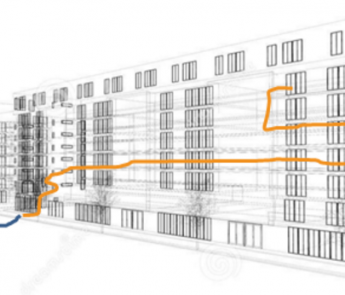

Figures: CPS indoor tracks on two one floor buildings. Median error about 10m.
A year goes fast when you have fun and our Indoor CPS project has now officially finished. We have accomplished quite a lot in just a year.
- New learning algorithms that improve indoor accuracy from 40m to below 20m
- New trilaterate lookup algorithms, that use accuracy of estimated wifis for better positioning
- One patent pending covering all great ideas developed
1) Learning algorithms (main focus for our project).
To repeat again, our goal is no manual learning and no calibration! All learning should be based on crowd sourced data. This is the onlyu way to make a truly global positioning service.
We have now been able to develop more robust algorithms and can now repeat our improvements in many buildings. The median error of scan and wifi position for one floor buildings are now between 9-20m everywhere, depending on densitity and quality of measurements.
We have now also developed algorithms for doing both multifloor and full 3D learning. The results so far show that we need less noisy measurements than what we get from RSS or we need more data on which floor scans actually have been made or some other data that helps. So we are not there yet where we take only crowdsourced RSS data from a building without any knowledge of floors and make a good model. There is still a research challenge going forward.
We are in progress of implementing the new learning algorithms in our production servers. When done we can really start to evaluate on a grand scale the performance and see where our new algorithms help and where they do not.
2) Lookup algorithms.
Improved lookup algorithms are now implemented and verified on our real servers. We now also take into account the accuracy of each wifi position when doing the trilateration. Performance is about same as we have today. To really get the benefit of the new algorithms, we need it to be based on the data from our new learning algorithms.
We would like to thank Vinnova, Sweden’s Innovation Agency, for sponsoring this project. We have applied for new funding so we hope for a continuation this fall. We still have the indoor location with Lund University set up and meet every week to discuss progress, even if it now is slower. Hope to come back with more exciting result later. Meanwhile use our CPS android app to start locating better indoor!
Thank you and have a great summer!
Recent Posts




